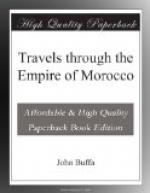The present empire of Morocco is properly the Mauritania Tingitania of the Romans, as the Mauritania Caesariensis comprised Algiers, Tripoli, and Tunis; and was so called from the Emperor Claudius. Tingitania was not decidedly reduced to a Roman province till after the death of Bocchus. Augustus afterwards gave the two Mauritanias, and a part of Getulia, to the younger Juba, as a remuneration for the loss of his father’s kingdom (Numidia). Ptolemy, his son, by Cleopatra (daughter of Antony and Cleopatra), succeeded him. In his reign, the Moors of this country were induced to revolt by a Numidian named Tacfarinas, who had served in the Roman army, and who, at the head of a set of barbarians accustomed to every species of robbery, assisted the revolt he had excited.
After a variety of successes and defeats, they were completely routed by Dolabella, the Roman General, and a body of Mauritanians sent to his assistance by Ptolemy, This conquest contributed to establish peace for a short time in these provinces; but at the death of Ptolemy (who was treacherously cut off by Caius), they again revolted, when Claudius first fixed a Roman army in Mauritania. His generals, though not without difficulty, succeeded in restoring tranquillity, which scarcely met with any interruption till the latter end of the fifth century, when the declining state of the Roman power favoured another revolt, in which the Moors entirely shook off the yoke of the Romans, assisted by the Vandals, under Genseric, who overran Africa, and obtained possession of most of the maritime towns. The Vandals were expelled in the seventh century by the Saracens, under the Caliphs of Bagdad, a ferocious and warlike race of Arabs, who, from conquest to conquest, had extended and removed their seat of government from Medina to the city of Damascus; thence to Cufa, and from the latter place to Bagdad; where they established their Caliphate authority.
Flushed with their success, and burning with the hopes of plunder, in the conquest of countries more fertile and richer, but less warlike than their own, they extended their arms as far as the western Mauritania. This country then remained for some time subject to the Caliphs of Bagdad, and was governed by their lieutenants, a set of cruel, arbitrary, and rapacious men.
The distance from the seat of government, and the oppressive manner in which the Caliphs ruled, excited universal commotion in this part, and considerably diminished their authority. Their generals, far from suppressing, openly encouraged these tumults, and severally aspired to the sovereignty. In the midst of these intestine broils, Edris, a descendant of Mahomet, fled into Mauritania, to avoid the persecutions of the Caliph Abdallah, who, to ensure the succession to his own family, had




